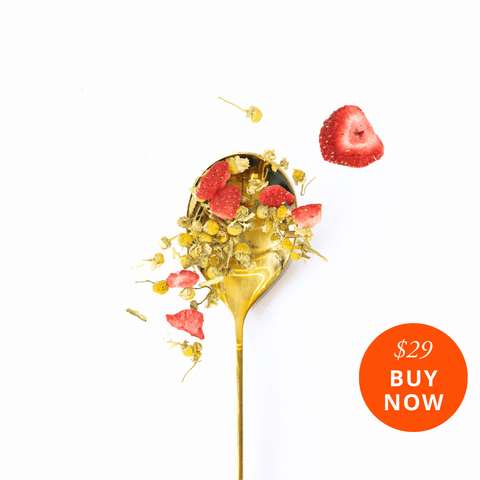Tea for sleep
Sleepy time teas
If you are the type of person who lies in bed at night thinking about having to buy stain remover for that wine stained blouse, your cat's fading eyesight, and what will happen to the housing market in the future, well, this sleepytime tea article is for you.
Herbal remedies are becoming more and more mainstream and there are dozens of teas for sleep to choose from. Herbalists will note that different bodies react to herbs in different ways. For example, some might feel energised after valerian root tea whilst others might conk out after a mild watery teacup of chamomile tea.
In general, the best teas for a restful sleep contain the following primary ingredients:
- Chamomile
- Research has found chamomile to have a depressant effect on the central nervous system. This increases activity of gamma-aminobutyric acid (GABA) which in turn inhibits brain activity, inducing sleep and reducing anxiety (Rahman & Colleagues research).
- Valerian Root
- A 2006 study found that people that used valerian root before bed almost doubled their chance of sleeping better when compared to those that took a placebo. Those that had valerian root tea fell asleep approximately 15 minutes faster than those that did not have valerian root tea (The American Journal of Medicine research).
- Lavender
- Studies have shown lavender to have calming effects on the nervous system and certain muscles. People commonly use lavender for anxiety, stress, and insomnia (Yap & Colleagues Research).
Botanicals that are caffeine free (lemongrass, coconut, fruit pieces, flowers etc) are also great options before bed or as complementary ingredients in tea.

Common questions about Sleep and Tea:
What does Valerian Root Tea taste like?
To be honest not the greatest. Valerian root is a potent botanical that has an earthy flavour profile. Luckily, you don't need much valerian to get the benefits so if it's well balanced in a tea alongside other complementary botanicals the taste isn't too pronounced. Check out our Sleeptime Tea or Relaxing Tea for great tasting and snooze-inducing tea blends.
Should I have Green Tea before bed?
No. Green Tea contains caffeine and caffeine has been associated with activating your nervous system that can make you feel more alert and awake.
What is the best tea for sleep?
Teas that include the primary sleep time tea ingredients including chamomile, valerian root, and lavender. As for taste, that's up to your personal preference.
What tea has caffeine?
Black tea, oolong tea, white tea, green tea, and puerh tea all have caffeine. Herbal teas such as lemongrass, chamomile flowers, peppermint, lavender, etc do not contain caffeine.
Relaxing Teas bundle
Includes 3 canisters of our favourite organic, herbal and caffeine-free teas to get you seriously snoozy ready for a good night's sleep:
Reminder: Utmost care was taken in creating the post. However, we still encourage seeking out medical support and exercising good judgment when it comes to health & wellness information. This post is general advice only and if you are pregnant or have medical concerns always consult a doctor before introducing herbs, botanicals, or teas into your diet.
Research References:
1. National Institutes of Health. Valerian: fact sheet for health professionals. 2013. https://ods.od.nih.gov/factsheets/Valerian-HealthProfessional/
2. Grieve M. A Modern Herbal. Vol. 2. New York: Dover Books; 1971.
3. Porwal A, Yadav YC, Pathak K, Yadav R. An Update on Assessment, Therapeutic Management, and Patents on Insomnia. Biomed Res Int. 2021 Oct 18;2021:6068952. doi: 10.1155/2021/6068952. PMID: 34708126; PMCID: PMC8545506.
4. Santos M. S., Ferreira F., Cunha A. P., Carvalho A., Macedo T. An aqueous extract of valerian influences the transport of GABA in synaptosomes. Planta Medica . 1994;60(3):278–279. doi: 10.1055/s-2006-959476. [PubMed] [CrossRef] [Google Scholar]
5. Bent S., Padula A., Moore D., Patterson M., Mehling W. Valerian for sleep: a systematic review and meta-analysis. The American Journal of Medicine . 2006;119(12):1005–1012. doi: 10.1016/j.amjmed.2006.02.026. [PMC free article] [PubMed] [CrossRef] [Google Scholar]
6. Srivastava JK, Shankar E, Gupta S. Chamomile: A herbal medicine of the past with bright future. Mol Med Rep. 2010 Nov 1;3(6):895-901. doi: 10.3892/mmr.2010.377. PMID: 21132119; PMCID: PMC2995283. [PubMed]
7. Avallone R, Zanoli P, Corsi L, Cannazza G, Baraldi M. Benzodiazepine compounds and GABA in flower heads of matricaria chamomilla. Phytotherapy Res. 1996;10:177–179. [Google Scholar]
8. Rahman MM, Uddin ME, Islam AM, Chowdhury MA, Rahman MA. CNS Depressant and Antinociceptive Effects of Different Fractions of Pandanus Foetidus Roxb. Leaf Extract in Mice. Malays J Med Sci. 2015 May-Jun;22(3):33-40. PMID: 26715894; PMCID: PMC4681719. [PubMed]
9. Shinomiya K, Inoue T, Utsu Y, Tokunaga S, Masuoka T, Ohmori A, Kamei C. Hypnotic activities of chamomile and passiflora extracts in sleep-disturbed rats. Biol Pharm Bull. 2005;28:808–810. [PubMed] [Google Scholar]
10. Yap & Colleagues research













